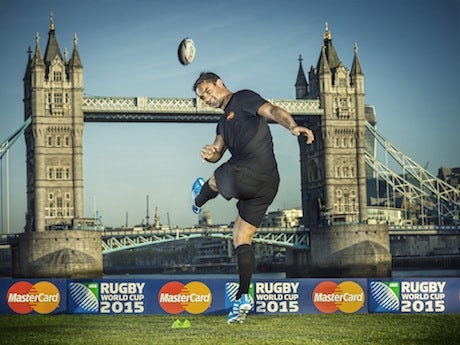MasterCard strikes Rugby World Cup deal to accelerate global expansion
MasterCard has signed a deal to sponsor the 2015 Rugby World Cup that will see it use the sport’s growing profile to strengthen the brand in emerging markets.

The payments firm announced the tie-up today (16 April) with brand ambassador and New Zealand rugby star Dan Carter kicking at London’s biggest set of rugby posts, Tower Bridge.
The quirky stunt revealed the brand’s plan to introduce the latest phase of its 16-year-old “Priceless” campaign leading up to the event next summer. A mix of rugby player tie-ups and social media promotions will be used to offer memorable experiences, similar to previous activations around Champions League matches and the Grammy Awards
MasterCard says the strategy aims to increase usage of its mobile payment services in key markets such as Rugby World Cup host nation England as well as expanding its online presence in emerging regions such as Kenya and Russia, where the sport is becoming more popular.
This includes supporting the roll-out of its contactless payments deal with TfL to transport networks beyond buses alongside launching new products and services under its partnership with mobile network EE in 2015. Mastercard claims the mobile deal is capable of reaching 80 per cent of handsets in the UK.
It will also use the event to introduce technology that enables its mobile services, including geo-location services, to function on different devices anywhere in the world.
Ann Cairns, president of international markets at MasterCard Worldwide, told Marketing Week it hopes to use the event to make its “Priceless” positioning feel more personal to customers.
A key way this will manifest itself is in rugby stadiums where the payments provider will allow spectators to use whatever card they want to purchase products rather than force them to only use MasterCard as rival Visa controversially did during the London 2012 Games.
Cairns adds: “MasterCard is in 210 countries and territories, while the International Rugby Board (IRB) governs 207. There’s great overlap in terms of business models.
“Global events like the Rugby World Cup are all about being inclusive so we’re not going to try and restrict people when it comes to using the service that they want to use. We’ll help build the infrastructure [at venues] but it will also work for our competitors so that people see our brand helping them do things. MasterCard is going to be the [only financial] brand on sites and creating “priceless experiences.”
The MasterCard deal completes the tournament’s global sponsorship roster, paving the way for organisers to begin their search for tier two and tier three partners.
Brett Gosper, chief executive of the IRB and managing director for Rugby World Cup, says the full set of global partners, which includes Heineken and Emirates, paid 40 to 50 per cent more in comparison to the previous tournament. It is testament to the sport’s growing profile alongside its ability to reach affluent consumers, he adds.
Gosper says: “The Rugby World Cup model is similar to how it’s been for the last two events. The Olympics have influenced the market in the UK more than the model has been influenced. The market has been well conditioned for us because a lot of brands have learnt how to deal with a major global event like the Rugby World Cup, which is the third biggest global sporting event after the Olympics and the football World Cup.”






